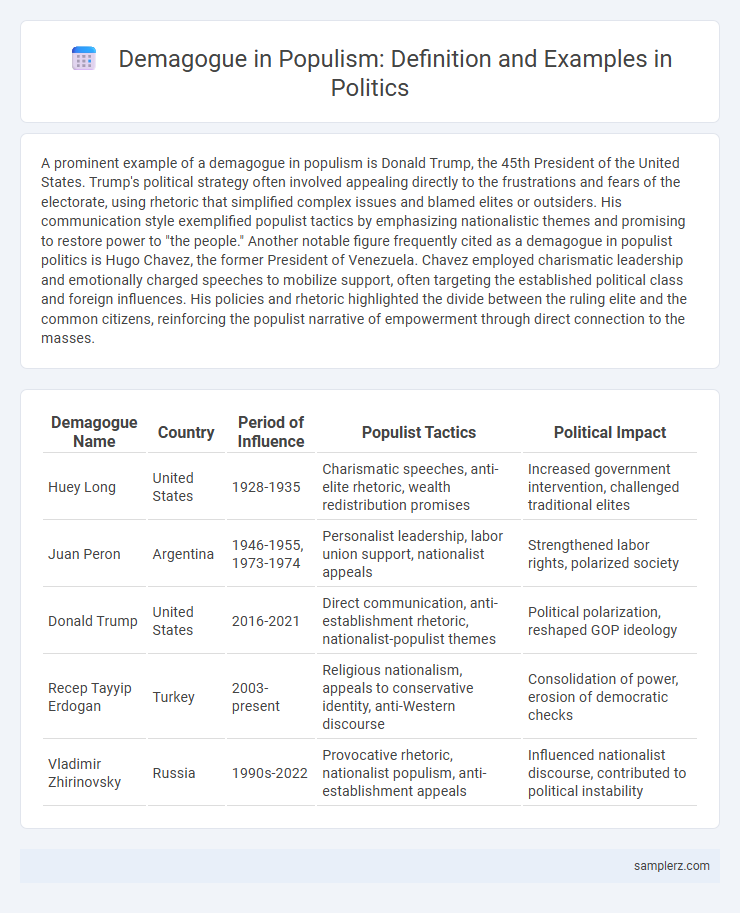A prominent example of a demagogue in populism is Donald Trump, the 45th President of the United States. Trump's political strategy often involved appealing directly to the frustrations and fears of the electorate, using rhetoric that simplified complex issues and blamed elites or outsiders. His communication style exemplified populist tactics by emphasizing nationalistic themes and promising to restore power to "the people." Another notable figure frequently cited as a demagogue in populist politics is Hugo Chavez, the former President of Venezuela. Chavez employed charismatic leadership and emotionally charged speeches to mobilize support, often targeting the established political class and foreign influences. His policies and rhetoric highlighted the divide between the ruling elite and the common citizens, reinforcing the populist narrative of empowerment through direct connection to the masses.
Table of Comparison
| Demagogue Name | Country | Period of Influence | Populist Tactics | Political Impact |
|---|---|---|---|---|
| Huey Long | United States | 1928-1935 | Charismatic speeches, anti-elite rhetoric, wealth redistribution promises | Increased government intervention, challenged traditional elites |
| Juan Peron | Argentina | 1946-1955, 1973-1974 | Personalist leadership, labor union support, nationalist appeals | Strengthened labor rights, polarized society |
| Donald Trump | United States | 2016-2021 | Direct communication, anti-establishment rhetoric, nationalist-populist themes | Political polarization, reshaped GOP ideology |
| Recep Tayyip Erdogan | Turkey | 2003-present | Religious nationalism, appeals to conservative identity, anti-Western discourse | Consolidation of power, erosion of democratic checks |
| Vladimir Zhirinovsky | Russia | 1990s-2022 | Provocative rhetoric, nationalist populism, anti-establishment appeals | Influenced nationalist discourse, contributed to political instability |
Defining Demagoguery in Populist Movements
Demagoguery in populist movements is characterized by leaders exploiting popular desires and prejudices to gain power through emotional manipulation rather than rational argument. Figures like Huey Long in 1930s America and more recent examples such as Donald Trump utilize simplistic rhetoric targeting societal grievances, often vilifying elites and minorities to consolidate support. This strategy undermines democratic institutions by fostering division and eroding trust in objective governance.
Historical Examples of Demagogues in Politics
Historical examples of demagogues in politics include Adolf Hitler, whose charismatic rhetoric and scapegoating tactics mobilized mass support in 1930s Germany. Huey Long, known as "The Kingfish," used populist appeals and promises of wealth redistribution during the Great Depression to gain Louisiana's governorship. Juan Peron in Argentina combined nationalist rhetoric with social welfare policies to build a loyal populist base during the mid-20th century.
Populist Leaders Who Used Demagogic Tactics
Populist leaders such as Hugo Chavez in Venezuela and Donald Trump in the United States employed demagogic tactics by appealing directly to popular desires and fears, often bypassing institutional checks and undermining established democratic norms. These leaders harnessed charismatic rhetoric and simplistic solutions to complex problems, fostering divisions and polarizing societies. Their strategies frequently included scapegoating minorities and using misinformation to consolidate power and erode opposition.
How Demagogues Influence Populist Agendas
Demagogues shape populist agendas by exploiting public grievances and intensifying social divisions through emotionally charged rhetoric. They often simplify complex political issues, presenting themselves as the sole voice of the "true people" against corrupt elites, which mobilizes mass support. This manipulation of fear and mistrust allows demagogues to redirect attention from substantive policy debates to identity politics and personal loyalty.
Rhetorical Strategies of Populist Demagogues
Populist demagogues frequently employ rhetorical strategies such as fear-mongering, scapegoating, and the creation of an "us versus them" narrative to consolidate power and appeal to popular grievances. Leaders like Hugo Chavez and Donald Trump manipulate emotional language and simplistic solutions to complex problems, fostering a direct connection with supporters while undermining institutions and experts. These tactics exploit societal divisions and amplify distrust in traditional political elites, reinforcing populist agendas.
Case Study: Demagoguery in 20th Century Populism
The most illustrative example of demagoguery in 20th-century populism is Adolf Hitler, whose rhetoric exploited economic despair and nationalist sentiments to mobilize mass support in Germany. His speeches manipulated fears and scapegoated minorities, undermining democratic institutions and paving the way for authoritarian rule. This case highlights how demagogues in populist movements can erode political stability by prioritizing emotional appeal over rational discourse.
Modern-Day Demagogues and Their Populist Appeal
Modern-day demagogues like Donald Trump and Jair Bolsonaro exploit populist rhetoric by scapegoating minorities and undermining democratic institutions to galvanize support. Their strategic use of social media amplifies divisive narratives, fostering distrust in mainstream media and political elites. These leaders often promise simplistic solutions to complex problems, appealing to economic anxieties and nationalistic sentiments among disenfranchised voters.
Media’s Role in Amplifying Demagogic Populists
Media outlets often amplify demagogic populists by providing extensive coverage that emphasizes emotional rhetoric and simplistic solutions, which resonate with disaffected audiences. Social media algorithms further exacerbate this effect by promoting sensational content that increases engagement, creating echo chambers that reinforce populist narratives. This amplification distorts public discourse and undermines democratic institutions by elevating polarizing figures who exploit media dynamics for political gain.
Impact of Demagoguery on Democratic Institutions
Demagogues exploit populist rhetoric to undermine trust in democratic institutions by spreading misinformation and inflaming social divisions. Their tactics erode norms of political dialogue, weaken checks and balances, and increase polarization within legislative bodies. This destabilization hampers governance effectiveness and threatens the rule of law fundamental to democratic systems.
Methods to Counter Demagogic Populism in Politics
Countering demagogic populism in politics requires promoting media literacy to help citizens critically evaluate political rhetoric and distinguish facts from emotional manipulation. Strengthening democratic institutions and ensuring transparency in governance reduces opportunities for demagogues to exploit public distrust. Encouraging inclusive dialogue and civic engagement fosters resilience against divisive populist tactics by empowering diverse voices within society.

example of demagogue in populism Infographic
 samplerz.com
samplerz.com